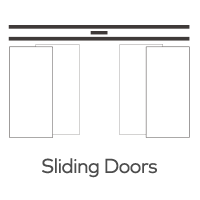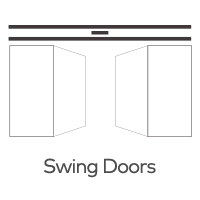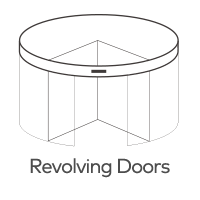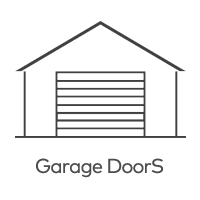How do automatic swing door sensor manufacturers address privacy and security concerns?
In the realm of automated entry systems, automatic swing door sensors play a pivotal role in ensuring smooth and secure access to buildings. To meet the highest standards of quality, safety, and reliability, it's imperative for manufacturers of automatic swing door sensors to obtain certain certifications. These certifications serve as tangible evidence of compliance with industry regulations and best practices. Let's delve into some of the essential certifications that automatic swing door sensor manufacturers should strive to attain.

1. ISO 9001: Quality Management System
ISO 9001 certification is a globally recognized standard for quality management systems. It demonstrates a manufacturer's commitment to consistently providing products and services that meet customer and regulatory requirements. For automatic swing door sensor manufacturers, ISO 9001 certification signifies adherence to stringent quality control processes throughout the design, production, and distribution phases, resulting in products of superior quality and reliability.
2. EN 16005: Safety Requirements for Automated Pedestrian Door Systems
EN 16005 certification is crucial for manufacturers of automatic swing door sensors as it pertains specifically to safety requirements for automated pedestrian door systems. Compliance with EN 16005 ensures that door systems are designed, installed, and operated in a manner that prioritizes the safety of users and bystanders. Manufacturers must demonstrate compliance with rigorous safety standards, including sensor performance, obstacle detection, and emergency stop functionality.
3. CE Marking: Conformité Européenne
CE marking is mandatory for products sold within the European Economic Area (EEA) and indicates conformity with essential health, safety, and environmental protection requirements. Automatic swing door sensor manufacturers must ensure that their products meet the applicable directives, such as the Machinery Directive (2006/42/EC) and the EMC Directive (2014/30/EU), to affix the CE mark. CE marking demonstrates compliance with EU regulations and facilitates market access within the EEA.
4. UL Certification: Underwriters Laboratories
UL certification is widely recognized in North America and indicates compliance with safety and performance standards established by Underwriters Laboratories. Manufacturers of automatic swing door sensors can obtain UL certification for their products, demonstrating adherence to rigorous safety and reliability requirements. UL certification instills confidence in customers and regulatory authorities regarding the safety and quality of the sensors.
5. FCC Compliance: Federal Communications Commission
For automatic swing door sensors incorporating wireless communication technology, FCC compliance is essential. Compliance with FCC regulations ensures that the sensors meet electromagnetic compatibility (EMC) and radio frequency (RF) emission standards, minimizing interference with other electronic devices and wireless networks. Manufacturers must conduct thorough testing and certification processes to achieve FCC compliance for their products.
6. RoHS Compliance: Restriction of Hazardous Substances
RoHS compliance restricts the use of certain hazardous substances in electrical and electronic equipment. Automatic swing door sensor manufacturers must ensure that their products comply with RoHS directives, which regulate the presence of substances such as lead, mercury, cadmium, and brominated flame retardants. RoHS compliance underscores a manufacturer's commitment to environmental sustainability and consumer safety.
Conclusion
Certifications play a crucial role in validating the quality, safety, and compliance of automatic swing door sensors manufactured by industry stakeholders. By obtaining certifications such as ISO 9001, EN 16005, CE marking, UL certification, FCC compliance, and RoHS compliance, manufacturers demonstrate their commitment to meeting regulatory requirements and delivering products of the highest standards. These certifications instill confidence in customers, enhance market competitiveness, and promote the widespread adoption of automated entry systems that prioritize safety, reliability, and performance.







